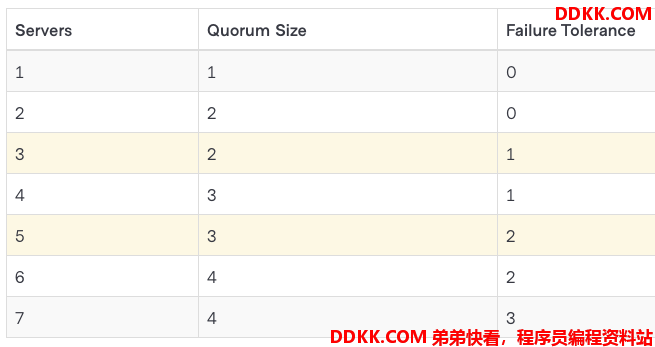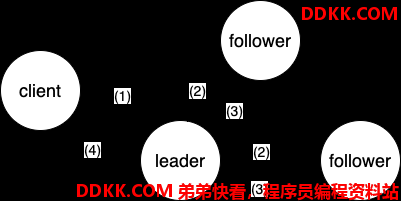Raft 是一种强一致性协议。注意是 consul 中 raft 指 servers 间的协议,与 client 无关。
当consul server 收到 consul client 转发的请求或者同步过来的信息时,consul servers 内部需要保持一致,这就是 raft 的作用。
Raft 的几个关键概念:
Log - 行为序列(ordered sequence of entries)。Entry 包括所有的集群行为:添加节点、注册服务、写kv对等等。
Peer set - 参与 log replication 的所有成员,即所有 servers。
Quorum - 法定人数。对于 N 来说,quorum = (N / 2) + 1,即刚刚超过半数的 servers 数量。
即当 servers 只有 2 个时,quorum 也为 2,则当其中一个不可用时,整个系统则无法达到 quorum 数,将无法更新集群状态,同时,考虑同步性能,推荐 server 数为 3 或者 5 个。为什么不是不推荐 4 个?因为 4 个和 3 个一样,都只能容错一台节点错误。

Committed Entry - 达到 quorum 数的 server 收到了某个 entry,则称这个 entry 为 committed entry。
Term - 任期。每个 Term 都是一个连续递增的编号,每一轮选举都是一个 Term 周期,在一个 Term 中只能产生一个 leader。
Raft 的节点一共有三种角色:leader、follower、candidate。所有的 server 一开始都是 follower 。
正常情况下 follower 从 leader 处接收 entry,如果超过一定时间没有接收到 entry,则暗示着 leader 有可能出问题,则该 follower 自动成为 candidate。注意,当 follower 接收到 client 的 RPC 请求,follower 不进行处理,而是转发给 leader 进行处理。
在candidate 状态下,可以请求其他的节点给自己投票。当票数达到 quorum 时,就转变为 leader 状态。
在leader 状态下,需要处理 log。如果是读请求,则 leader 根据当前状态返回所需结果,如果是写请求,则生成一个新的 log 并且开始同步,直到 这个 log 被 committed(达到 quorum 数节点收到) 并且 applied(写入状态机)则写完成。
一致性模式
default - 只允许 leader 节点响应请求,但是当 leader 节点变更时,可能会出现两个 leader ,在这种情况下,老 leader 响应的可能是脏数据。
consistent - 强一致性但是最慢,leader 在响应读请求时,需要遍历其他节点确保自己是 leader。
stale - 允许非 leader 节点响应读请求。速度最快,但是值有可能是过期的(通常不会超过50ms过期)。
关键过程
raft 主要包括 Leader Election 和 Log Replication 两个关键步骤。
Leader Election
心跳超时(heartbeat timeout) - follower 与 leader 进行通信的最大时间间隔。
选举超时(election timeout) - candidate 收到每张选票的最大时间间隔。
当follower 心跳超时,会成为 candidate 进行选举开始选举。candidate 会向每个节点请求投票(request votes),若出现选举超时,则重新开始请求投票;若收到法定人数的计票则成为 leader。注意 candidate 会在开始请求投票之前给自己投一票,即只需(法定人数 - 1)张票即可。
注意当candidate 和 leader 接收到新 term 的请求时,都会退化为 follower。

Log Replication
leader 需要向其他节点同步操作,即 log replication 过程,该过程通过 append entry 指令发出。当有法定数节点(包括 leader 自身)感知到状态更新后,即称为该 log 为 committed。
所以一个有 3 个和 4 个 servers 的 raft 集群,容错节点数都为 1 个节点。
一次完整 Log Replication 如下进行:
1、 client请求leader更新状态;
2、 leader向其他节点发出appendentry指令;
3、 其他节点相应指令并成功返回给leader;
4、 当leader发现log已committed,即返回给client;

实现
当agent 运行在 server mode 下时会初始化 raft 实例:
https://github.com/hashicorp/raft
func NewRaft(conf *Config, fsm FSM, logs LogStore, stable StableStore, snaps SnapshotStore, trans Transport) (*Raft, error) {
// ...
// 初始化为 follower
r.setState(Follower)
// Start as leader if specified. This should only be used
// for testing purposes.
if conf.StartAsLeader {
r.setState(Leader)
r.setLeader(r.localAddr)
}
// ...
// Start the background work.
r.goFunc(r.run)
r.goFunc(r.runFSM)
r.goFunc(r.runSnapshots)
return r, nil
}
重点关注 r.goFunc(r.run) 中的 run 方法:
// run is a long running goroutine that runs the Raft FSM.
func (r *Raft) run() {
for {
// Check if we are doing a shutdown
select {
case <-r.shutdownCh:
r.setLeader("")
return
default:
}
// 根据节点当前角色运行对应的处理函数
switch r.getState() {
case Follower:
r.runFollower()
case Candidate:
r.runCandidate()
case Leader:
r.runLeader()
}
}
}
对于follower 来说需要处理心跳超时:
// runFollower runs the FSM for a follower.
func (r *Raft) runFollower() {
didWarn := false
r.logger.Info("entering follower state", "follower", r, "leader", r.Leader())
metrics.IncrCounter([]string{
"raft", "state", "follower"}, 1)
heartbeatTimer := randomTimeout(r.conf.HeartbeatTimeout)
for r.getState() == Follower {
select {
case rpc := <-r.rpcCh:
r.processRPC(rpc) // setLastContact
// ...
case a := <-r.applyCh:
// Reject any operations since we are not the leader
a.respond(ErrNotLeader)
case <-heartbeatTimer: // 心跳超时
// 重置随机 timeout,避免同时进行选举
heartbeatTimer = randomTimeout(r.conf.HeartbeatTimeout)
// Check if we have had a successful contact
lastContact := r.LastContact() // 上一次和 leader 通信的时刻
if time.Now().Sub(lastContact) < r.conf.HeartbeatTimeout {
continue
}
r.setLeader("") // 至此, leader 通信失败,置空 leader
r.setState(Candidate) // 转为 candidate 角色,跳出循环
case <-r.shutdownCh:
return
}
}
}
其中的processRPC 方法会执行 append entry 等指令:
func (r *Raft) processRPC(rpc RPC) {
if err := r.checkRPCHeader(rpc); err != nil {
rpc.Respond(nil, err)
return
}
switch cmd := rpc.Command.(type) {
case *AppendEntriesRequest: // 适用于 follower 的 append entry
r.appendEntries(rpc, cmd)
case *RequestVoteRequest: // candidate 请求投票
r.requestVote(rpc, cmd)
case *InstallSnapshotRequest:
r.installSnapshot(rpc, cmd)
case *TimeoutNowRequest:
r.timeoutNow(rpc, cmd)
default:
r.logger.Error("got unexpected command",
"command", hclog.Fmt("%#v", rpc.Command))
rpc.Respond(nil, fmt.Errorf("unexpected command"))
}
}
针对candidate 来说需要处理选举超时:
// runCandidate runs the FSM for a candidate.
func (r *Raft) runCandidate() {
r.logger.Info("entering candidate state", "node", r, "term", r.getCurrentTerm()+1)
metrics.IncrCounter([]string{
"raft", "state", "candidate"}, 1)
// 开始请求其他节点给自己投票,注意自己会给自己投一票
voteCh := r.electSelf()
electionTimer := randomTimeout(r.conf.ElectionTimeout)
// Tally the votes, need a simple majority
grantedVotes := 0
votesNeeded := r.quorumSize() // 法定人数即超过半数节点数
r.logger.Debug("votes", "needed", votesNeeded)
for r.getState() == Candidate {
select {
case rpc := <-r.rpcCh:
r.processRPC(rpc)
case vote := <-voteCh:
// 如果发现有更新的 term 则退化为 follower
if vote.Term > r.getCurrentTerm() {
r.logger.Debug("newer term discovered, fallback to follower")
r.setState(Follower)
r.setCurrentTerm(vote.Term)
return
}
// Check if the vote is granted
if vote.Granted {
grantedVotes++
r.logger.Debug("vote granted", "from", vote.voterID, "term", vote.Term, "tally", grantedVotes)
}
// 成功当选为 leader
if grantedVotes >= votesNeeded {
r.logger.Info("election won", "tally", grantedVotes)
r.setState(Leader)
r.setLeader(r.localAddr)
return
}
case a := <-r.applyCh:
a.respond(ErrNotLeader)
case <-electionTimer: // 选举超时
r.logger.Warn("Election timeout reached, restarting election")
return
case <-r.shutdownCh:
return
}
}
}
参考:
- https://www.consul.io/docs/architecture/consensus
- http://thesecretlivesofdata.com/raft
- https://raft.github.io/
版权声明:「DDKK.COM 弟弟快看,程序员编程资料站」本站文章,版权归原作者所有
来源:https://blog.csdn.net/jikunk8/category_10622611.html